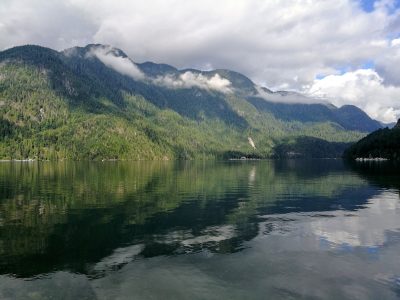What did the Burrard Inlet look like in the past, compared to how it is now? What were the fishing, food source, and maritime resources there and how did this habitat change over time? UBC researchers sought to answer those questions, in a clear and interactive way.

Granite Falls near Indian Arms on Burrard Inlet, Vancouver, BC. Photo: © Fanny Couture
Burrard Inlet has been home to Tsleil-Waututh Nation (The People of the Inlet) for thousands of years, long before European settlers came in the 1700s. The Nation “hunted, fished, and harvested abundant food in and around Burrard Inlet, including crabs, clams, mussels, oysters, fish, duck, deer, bear, elk, pheasant, berries, and other food and medicinal plants,” said Tsleil-Waututh Nation employee, Spencer Taft. Even today, the inlet is an important source of food, livelihood, and recreation for all the communities that live along its shores.
However, “the Inlet has experienced a lot of change over the past several hundred years, and this has impacted food production and put many of the plants and animals at risk,” said Fanny Couture, a PhD student, and one the Ocean Leaders Program research members who developed the website.
“The Inlet is an important place for recreation and food for all of the communities around Metro Vancouver, but it is often unsafe to swim in and eat food from the waters,” said Meaghan Efford, a PhD student and another member of the Ocean Leaders Program research team. “Much of the habitat has, over the years, been lost to industrial and commercial activity. Protecting the Inlet from further damage would be beneficial to everyone along its coastline.”
The StoryMap, and additional learning resources, can be found at www.changeinburrardinlet.ca.
The StoryMap project was conducted through a partnership between UBC’s Training our Future Ocean Leaders Program and West Coast Environmental Law. “Ocean Leaders” is a professional development program for graduate students and post-doctoral fellows supported by the Natural Science and Engineering Research Council. West Coast Environmental Law commissioned but is not financing the project. The graduate student authors are Fanny Couture, Meaghan Efford, Roshni Mangar, and Matias Oddo.
Tags: Aboriginal fisheries, climate change, environment, Indigenous fisheries, IOF students, Ocean Leaders, Tsleil-Waututh Nation, Vancouver